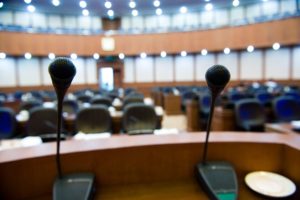Chapter Spotlight: Charleston Humanists Fight School Board Prayer

The first reading of Charleston County School District’s plan to implement school board prayer will be on the agenda for Monday, February 27. It’ll require a second reading to pass into policy, but the Secular Humanists of the Lowcountry is fighting to stop that and get religion out of government meetings. “We’re facing a teacher shortage, COVID-related learning loss, and dramatic racial inequities in student outcomes, but one of the board’s first actions was to add public prayer to the policy that governs school board meetings,” said group President Bonnie Cleaveland.
Cleaveland and her group (a chapter of the American Humanist Association) became active after reading an article in The Post and Courier about the board’s January 9th meeting, where the policy amendment was introduced. The original addition to the policy began with: “The board recognizes the United States of America was founded on Christian ideals, and as such should start board meetings with a prayer…”, and quoted a prayer Abraham Lincoln gave in his Proclamation 3750. Fortunately, that language has been removed, along with the condition that board members should invite local faith leaders. Despite two members commenting that they didn’t believe the addition was necessary—as individuals can pray to themselves during the moment of silence—others liked that the policy puts in writing that board members may pray together aloud.
According to the policy, the prayer or invocation must “precede public business and not be part of public business”. It’s not yet clear if that means before the meeting is called to order or before or after the moment of silence and Pledge of Allegiance. It is clear that some members want to do it publicly, although the policy states it “must be directed only at the board members themselves.” In an attempt to be inclusive, the prayer must be nonsectarian, not invoke one religion in preference of others, and may only reference God or “The Almighty.” Although this still doesn’t recognize nontheists, it’s an improvement from the original text—“may not reference Jesus, Jesus Christ, Christ, Savior, or a patron saint”—which was seen as oppressive to Christians. In the discussion (from 1:49 to 2:04 on the recording), interim co-general counsel Alice Paylor stated, “You don’t want people praying to Buddha and all that stuff.” To which board member Dr. Carol A. Tempel replied, “But why not? If we’re a diverse system then we need to recognize the fact that we have diversity.” Then board member Leah Whatley claimed it’s inclusive by being general for all people of faith but (a) many religions don’t pray to a generalized deity, (b) some religions don’t have any deity, and (c) not all Charlestonians are people of faith.
To oppose the new prayer policy, Secular Humanists of the Lowcountry members wrote letters to the editor and a guest column for the Holy City Sinner, provided public testimony, and reported the violation to South Carolina American Civil Liberties Union, American Atheists, and Freedom from Religion Foundation (FFRF). They met with board members and are helping others speak up to defend the Establishment Clause. Parents participated in public testimony emphasizing the importance of separation of church and state, and noting that not all students are Christian. Christians urged the school board to respect our Constitution’s wall of separation, realizing that both religion and government prosper when independent.
When presenting the amendment during the January 9th meeting, one board member defended the policy by claiming that prayer is common in various government settings. However, FFRF’s letter to the board explained that a school board praying publicly is unconstitutional. “It is coercive, insensitive, and intimidating to force nonreligious citizens to choose between making a public showing of their nonbelief by refusing to participate in the prayer or else display deference toward a religious sentiment in which they do not believe, but which their school board members clearly do.”
As of this writing, the votes are likely to be at least 5-4 in favor of the public prayer amendment, with the main argument that board members have a right to pray publicly. But what happens when the policy is violated by board members or invited guests proselytizing their religion? Will they be fined, reprimanded, or removed? Will the board direct funds to respond to a lawsuit instead of improving the county’s education system? In her public testimony at Charleston County School District board meeting on January 23, Cleaveland concluded by urging board members, “Pray privately, OR…. pray silently, and get on with the business of education.”
The Secular Humanists of the Lowcountry are excited to share and learn about tactics being used across the country to end Christian Nationalists’ harmful influence on schools and government. Contact them at activism@lowcountryhumanists.org and keep up with American Humanist Association alerts from our Humanist Action Headquarters. Together we can and must work towards a real inclusive democracy.
